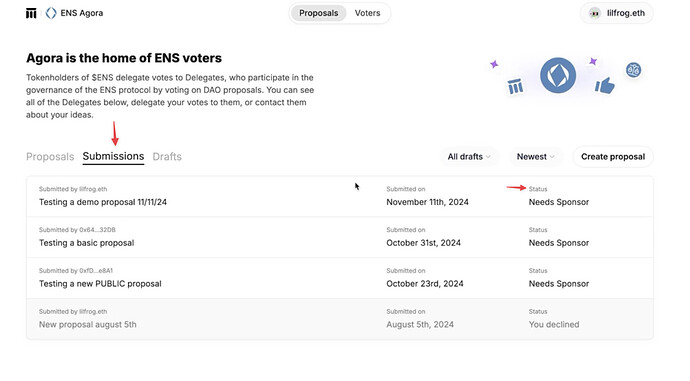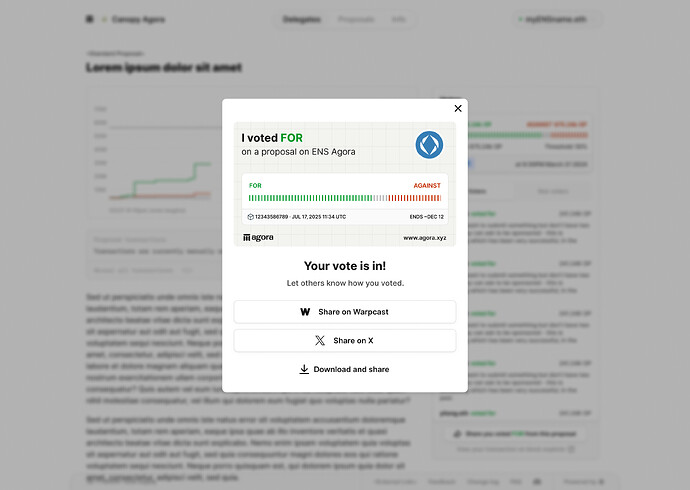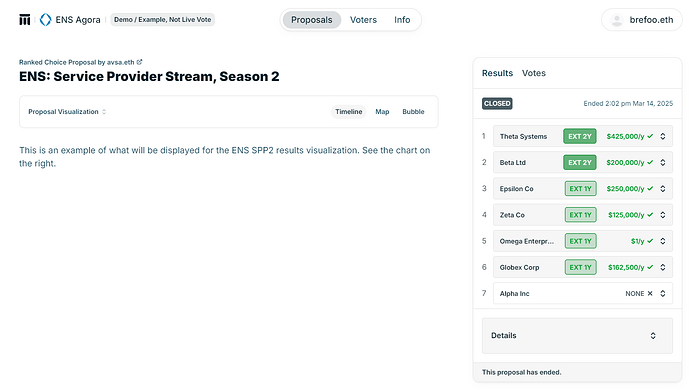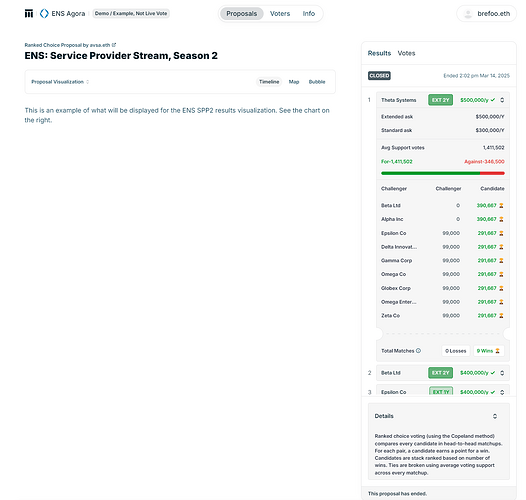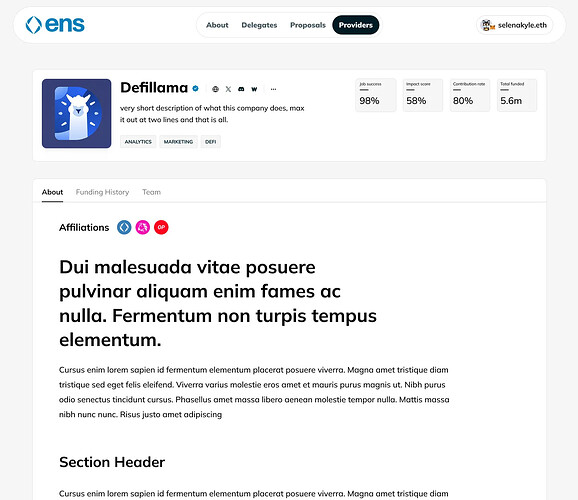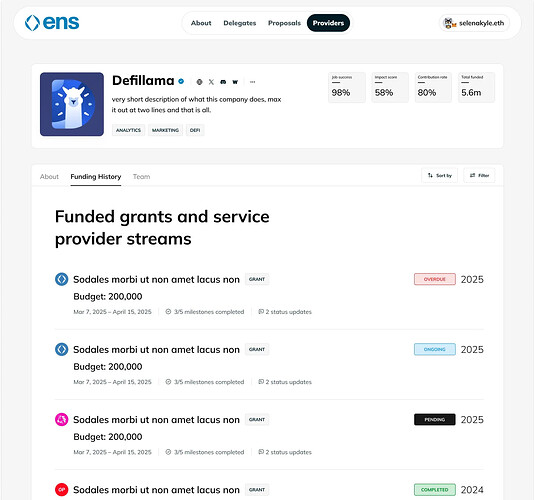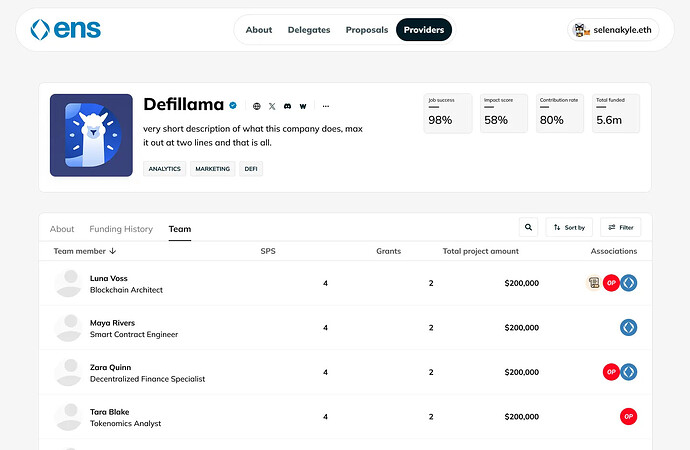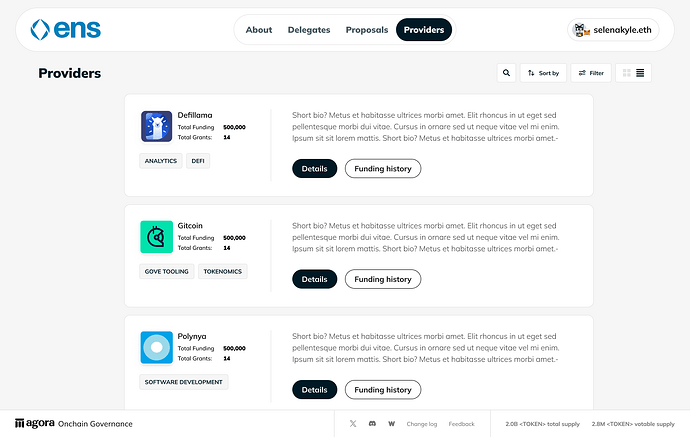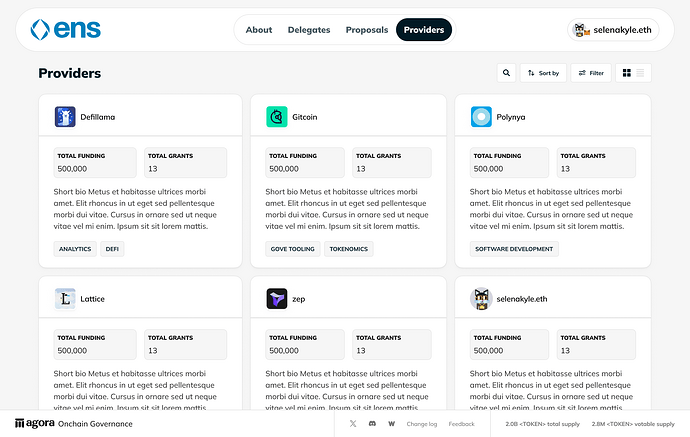1. Applicant Information
Company Name: Agora
Websites: https://www.agora.xyz https://github.com/voteagora/
Primary Contact/Entity ENS Name: voteagora.eth
Primary Contact(s)
- Kent Fenwick, CTO & cofounder, kentf.eth
- Brennan Foo, head of customer experience, brefoo.eth
- Maz, cx implementation lead, mmaz.eth
Company Overview
- Agora builds governance infrastructure for the world’s best DAOs. Our tools and contracts are trusted by leading protocols including Optimism, Scroll, Linea, and more. We currently build and maintain agora.ensdao.org.
- We are a team of 16-20 (incl. smart contract/full-stack/backend/data, and ops).
- Our governance smart contracts are used by communities like Optimism’s Token House, Scroll DAO, and many others.
Requested Amount:
- $300,000 (basic scope, 1 yr)
- $400,000 (extended scope, 1 yr)
- (Not eligible for 2-yr stream since Agora was not part of SPP1)
Size of team and commitment
- Agora is a team of ~16-20 full-time contributors (most shown here); 11 of whom are in product, engineering, and design. Several of the remaining team members (like Brennan & Maz, who lead customer success & implementation respectively) will be familiar to DAO members who frequent MetaGov calls. We are also actively growing our engineering team (both full-stack and smart contract). If you’re reading this and interested, you’re the exact type of person we want to speak with; please drop us a line here!
- We proactively pursue user feedback and have been driving material governance initiatives for ENS since 2022 (see Agora on ENS Ledger), incl. building/improving/hosting agora.ensdao.org.
- This is not a side project. Supporting ENS is a top strategic priority for us. Our roadmap outlined below significantly increases our commitments to ENS.
2. Eligibility Confirmation
Company Age & Reputation
- Agora was founded in 2022. Our key offering is helping protocols navigate progressive decentralization, and that takes the form of smart contract engineering, governance applications, and governance advisory services.
Team Experience
- Our team has deep experience with governance at both the smart contract and user experience layers, and in crypto more broadly.
- Team is ex-Coinbase, Kraken, Ethereum Foundation, Moonpay, Magic Eden. Our SC engineers worked on MACI. Our implementation lead wrote her Master’s thesis on blockchain in 2017.
- Smart contract expertise → We are core developers for Optimism and maintain the Optimism governor, and our CTO Kent is a member of OP’s Security Council. We’ve also developed governance tokens like ERC20VotesPartialDelegationUpgradeable (Github), which enables token holders to delegate to multiple delegates instead of just one. We frequently navigate audits with organizations like OpenZeppelin, Cyfrin, Trust Security, and Consensys Diligence.
- We’ve also designed, built, load tested, and deployed token launch infrastructure for Scroll’s token claim (including smart contracts and https://claim.scroll.io/), distributing more than $50,000,000 worth of tokens.
- We’ve worked with top protocols—either on governance platforms, advisory services, or both—including ENS, Optimism, Uniswap, Linea, Scroll, Lido, Nouns, Derive, Ether.fi, Cyber, B3.fun, Xai.games, and several others not yet public.
ENS Token Endorsement Requirement
- 5pence.eth is explicitly endorsing Agora for the eligibility requirement for SPP2. At the time of submitting this 5pence has well over the 50K voting power required to endorse a candidate for eligibility (currently at ~115.7K of voting power).
Consultative Process & Agora Endorsement from Avsa
-
In building this roadmap, we’ve consulted with numerous delegates including 5+ with ~100K+ of delegated votes, 8+ with ~25K+ delegated votes, and many others to ensure our proposed roadmap best reflects the will of the DAO.
-
Alex Van de Sande / Avsa (ENS co-founder) says:
I believe that it’s crucial for the DAO to make sure that its governance doesn’t depend on a single provider and that all the pieces we use for voting should be interoperable. Agora is the team for that job. I’ve worked with them extensively as a metagov steward and they proved themselves to be very proactive in identifying issues and developing mature governance toolings as a response. I trust their capabilities to work on governance tooling for the very particular way in which ENS operates.
OFAC Sanctions Compliance
- None of our team members are in OFAC-sanctioned nations. Our team members are located in the United States (California, Oregon, New York, North Carolina, Colorado, Massachusetts), Canada, India, Brazil, and the Philippines.
- We, Agora, confirm that neither our organization nor any of our employees, contractors, or executive leadership is located in, or a resident of, an OFAC-sanctioned country. We further confirm that none of our business resources are derived from or routed through any country or entity that is subject to sanctions imposed by the United States (OFAC) or equivalent regulatory bodies. We pledge to remain compliant with all applicable sanctions laws and will promptly notify the ENS DAO if our status changes.
Multi-Year Stream Eligibility
- We didn’t participate in SPP1, so we’re not eligible for the 2-yr stream.
3. Open Source Commitment
- The vast majority of Agora’s product, engineering, and design work follows the MIT license. This includes the core Agora application (which powers agora.ensdao.org).
- Agora Governor, which may be relevant as ENS moves to Namechain, is also fully MIT open source.
- We’re committing that any work funded by SPP2 will follow the MIT open source license, too.
4. Scope of Work & Budget
Both the Basic and Extended scopes of work follow the same key themes. We’re focused on supporting governance health. Specifically, all efforts support one of the following key goals.
Key Goals
- Goal #1: make capital allocation more transparent and legible
- Goal #2: increase participation and DAO security
- Goal #3: support the DAO’s evolving governance with the launch of Namechain
Below, we’ll outline specific initiatives applicable to each scope of work ![]()
Note: Agora’s latest contractual agreement with ENS ended in Nov 2024, but Agora has continued to support ENS and the DAO by shipping features and doing work that we think is valuable for the DAO. We’re including some of these features in the SoW below (only those shipped after Nov 2024) with the hope that the DAO recognizes Agora’s actions. We chose to participate in the SPP2 stream (vs. attempting to seek funding from ENS elsewhere) both (1) to accommodate suggestions from key ENS stakeholders (incl. Avsa and MetaGov stewards) who suggested that the Service Provider Program was a more ideal (public, legible) source of funding for Agora’s partnership with ENS, rather than working directly with MetaGov, and (2) because generally, we’re really excited about the nature of SPP2 and how ENS is proactively experimenting with new funding mechanisms [e.g. Ranked choice x Copeland voting]. It’s an honour to participate, and we’re here for it.
4.1 Basic Scope of Work
Requested amount: $300K USD
Key offerings included at the Basic SoW ![]()
4.1.1 Core app (agora.ensdao.org) feature improvements.
Meta: We’re hesitant to commit to a product roadmap months in the future because we want to be nimble and responsive to the evolving needs of the DAO. For example, had we participated in SPP1 and had a firm scope on our SoW, it might not have made sense for Agora to build the SPP2 visualization.
However, here are some relevant features that we are committed to shipping before the end of the 1 year of the Service Provider Program. We would return or forfeit 20% of the funds if we did not accomplish the following:
-
Better transaction building and visualizations on proposals
- Supports DAO participation and security (Goal 2) by enhancing transaction legibility
- Supports DAO participation and security (Goal 2) by lowering barriers in creating txns for proposals with onchain txns
-
Improving Proposal Sponsorship
- What this is: Proposal Sponsorship allows delegates who do not meet the proposal threshold (100K of tokens in voting power) to draft proposals and request that others sponsor them.
- An improved UI means having a dedicated proposals/submission page where participants can draft proposals, and request sponsorship either (1) publicly, where any delegate with >100K in voting power could sponsor/submit the proposal, or (2) by requesting specific >100K VP voters to sponsor their proposals.
- Supports DAO participation (goal 2) by allowing more participants to create proposals while (1)
 not requiring governor changes
not requiring governor changes  , and (2) still preserving DAO security by requiring voters with 100K+ voting power to submit/sponsor these proposals.
, and (2) still preserving DAO security by requiring voters with 100K+ voting power to submit/sponsor these proposals. - Explicitly, this is an alternative to Agora’s previous work in attempting to drive forward Proposal Bond (see EP 5.15). After extensive discussions with Delegates, we determined that we would not achieve a clear consensus that the benefit of Proposal Bonds (lowering barriers to proposing) was worth upgrading the Governor, especially with Namechain (and likely Governor changes) planned for 2025-26. This is a different means of accomplishing the same goal without requiring any Governor changes.
-
Share my Vote: Easy way for delegates to share how they voted on socials including X and Farcaster (shipped March 2025!)
- Supports goal #2 (increasing DAO participation and security)
-
Better native SAFE integration for delegates that navigate governance using a SAFE wallet
- Goal is to increase DAO participation and security (goal 2) by making it easier to vote with SAFE multisigs
-
Delegate Rank over time: Which delegates are the most powerful on a week to week basis
- Goal is to increase DAO participation and security (goal 2); the thesis is that making voting power changes over time more legible will help the DAO be able to understand every actor’s incentives more clearly, and to monitor significant changes.
- Serves similar needs as Slobo.eth’s votingpower.xyz, with different data lenses.
- Some delegates have flagged that this may seem like a niche offering that might not change often—and that’s true. But if/when there are significant changes in voting power, a more legible way of understanding how voting power changed could be useful.
-
Improvements to delegate discovery: Making it easy for new token holders to delegate their tokens, increasing the votable support remains a top priority for Agora.
- Supports goal #2 (DAO participation and security)
-
Improved mobile UX/UI: Continuing to make it easy to stay informed on your mobile device.
- Supports goal #2 (DAO participation and security)
-
Continuous speed and performance improvements
- Supports goal #2 (DAO participation and security)
4.1.2 Helping future proof the DAO with Namechain L2 governance
- Relates to goal #3: support the DAO’s evolving governance with the launch of Namechain
- Context: We know Namechain is on the horizon (~late 2025 or 2026), and based on our conversations with delegates, we suspect that major governance changes for ENS are unlikely before then (”why upgrade the governor and introduce new risk if we think the ENS DAO will launch new governance soon?”). Our plan is to stay closely involved, ensure Agora is ready to adapt, and collaborate on what the next iteration of the ENS Governor should look like. You can think of Agora as on retainer for governance advisory.
4.1.3 Other products integrations we’re exploring, and might build, but are not explicitly 100% locked in as part of the SoW:
- Integration with Blockful’s transaction review product. Given Blockful’s proposal to review onchain transactions, showing if they are or are not verified onchain before would be a huge benefit to the DAO.
- Enhanced Delegate Profiles built on ENS primitive records and integrations into ENS based protocols like the EFP.
KPIs / Success Metrics
- (Full program and quarterly) 90%+ attendance for weekly MetaGov calls by at least 1 Agora team member; meant to be associated with both 4.1.1 and 4.1.2; the spirit of this is to capture Agora’s continued participation in ENS governance conversations.
- (Quarterly) Reporting against features shipped to the ENS Agora client.
- (Quarterly) Reporting against bugs/feedback with the ENS Agora client shared with the Agora team, and how we responded to these bugs/feedback.
- (Quarterly) 99%+ uptime of ENS Agora client.
- (Quarterly) Support 100% of onchain votes, with prompt release of frontend updates based on user feedback.
4.2 Extended Scope of Work
Requested amount: $400K USD total (100K on top of Basic SoW)
Description: Everything in the Basic Scope of Work, plus the key offerings outlined below.
4.2.1 Key extended offering #1: SPP2 Results Visualization
-
Supports goal #1: making capital allocation more transparent and legible.
-
User story/problem this solves:
- SPP2 is an experiment of a new, Avsa/ENS-pioneered decentralized funding mechanism. It uses ranked choice voting and the Copeland method of tabulating results. This mechanism empowers voters with greater nuance and choice in their voting, but the results of the Copeland method are more complicated to grok than the methodology used in SPP1.
- This visualization is meant to offer transparency and legibility into the calculations so that everyone can easily understand who will receive funding based on the current state of the votes.
-
Meta: Agora will have completed this work by the time SPP2 voting is live. Our hope is that the DAO will choose to reward Agora retroactively.
-
Design mocks (WIP; all data is fake/placeholder)
4.2.2 Key extended offering #2: Decentralized Service Provider Registry & Visualization
-
Supports goal #1: making capital allocation more transparent and legible.
-
User story/problem this solves:
- User is a participant in ENS DAO. User wants to understand commercial relationships between ENS<>Specific Service Providers. How user currently discovers this information: searching through the forum, browsing SPP1/SPP2, poring over EPs.
- While the information exists publicly (in forums, and within Snapshot or onchain proposals), this information is not indexed and searchable in a way that is easily legible to User.
-
So, what is this thing? Design mocks below, but imagine a portal that:
- Shows all entities with a commercial relationship with ENS, and their ENS funding history
- Includes profiles for these entities/project owners where they provide updates to the ENS community they serve
- Enriches and contextualizes the data already visible on ens-ledger.app
- where appropriate, integrates with ens-ledger.app (which is great as a source of truth for streams of funding, but doesn’t currently capture all context associated with the funding)
-
Rationale/Add’l Context
- This work will give the community transparency, accountability, and legibility; improve operational efficiency of future SPP seasons; and incentivize good behaviour for all participants.
- Agora works closely with Optimism on their RetroFunding initiative and has built a decentralized registry that powers the atlas.optimism.io/ web app that delivers 20 million $OP tokens to community members each year.
- The system is built on top of the EAS Protocol and lives on OP Mainnet. The registry currently contains over 4,252 projects and over 6,246 users with a goal of mapping the entire onchain ecosystem in the next 3 years. We’d love to bring similar infrastructure to ENS DAO to help provide clarity to ENS voters as they assess and vote on SPs.
- SP Profiles could capture more wholly the work they do not just with ENS, but with other protocols as well.
- Over time, we will also consider adding the following features (subject to further delegate & service provider feedback):
- Verified communication and updates from projects
- Decentralized review / rating system (think Capterra)
- Unified KYC of service providers (reducing overhead for both service providers and protocols/DAOs)
- ENS will be able to stand on top of the work that Agora is doing for the OP/Superchain community and add valuable signal to both communities.
-
Design mocks (Beta/WIP; all data is fake/placeholder)
KPIs / Success Metrics
- Everything in the Basic SoW, and…
- (Quarterly) Reporting on progress against building this Decentralized Service Provider Registry.
- (By end of program) Built and shipped it!
4.3 Second Year Stream Scope of Work
- N/A for SPP2, but we’re very likely to apply again for SPP3.
5. Past Achievements & Additional Information
It feels like we’ve pumped our own tires a lot already (especially in section 2, Eligibility Confirmation).
We’ll highlight a few key contributions to ENS, though:
- Continuously contributing ideas that aim to improve the DAO’s governance health, even if they ultimately did not pass (e.g. Proposal Bond initial exploration, temp check; increasing votable supply by unlocking Coinbase’s delegations)
- Incorporating EFP & ENS Records support into Agora (forum post); see demo on brantly.eth’s Agora profile
- An improved proposal sponsorship and lifecycle management flow (forum post)
- Gasless delegation & voting on ENS Agora (forum post)
- Using EFP For more, see Kent (Agora CTO)’s submissions on the forums: https://discuss.ens.domains/u/kent_agora/activity
Other links to explore if you’re trying to get to know Agora better:
- We follow governance attacks closely (e.g. Agora co-founder Yitong discussing the Compound Governance attack in July 2024)
- Delivery at Dawn, a short film celebrating EIP-4844, initiated by Agora co-founder Yitong and funded by Nouns DAO
- Amplifying EFP to the world (Twitter)
- Agora on Github, where you can find 27+ public repositories
- Our docs site (very much WIP, but we’ll be making big strides here in 2025)
6. Video Intro (just 2min11s if you watch on 2x  )
)
7. Conflict Of Interest Statement & Disclosures
- None of our team members are Stewards, or candidates for Stewardships.
- None of our team has compensated positions at ENS Labs, Karpatkey, or any other project that is currently receiving funding from ENS DAO.
8. Disclosures
These were optional/encouraged in the template. We talk a lot about transparency, so aim to walk the walk as well.
- Agora has commercial relationships with several protocols (discussed in Section 2 > Eligibility Confirmation > Team Experience), but none that a reasonable person would consider directly competitive with ENS.
- Agora has raised some funding. Agora is generating revenue, but is not profitable. We are, however, financially healthy, with at least several years of runway.
Note: If you made it this far — thank you for reading this. Nurturing healthy governance is serious work, and we appreciate ya.
